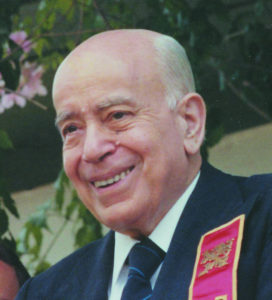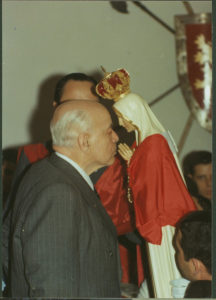 Representative characters are those who touched our lives and have a lasting influence upon us. Most people can remember someone in their own lives who served as mentor, guide and director. These figures are important because they inspire and push the person to develop fully inside the context of society. They are an essential element to any return to order.
Representative characters are those who touched our lives and have a lasting influence upon us. Most people can remember someone in their own lives who served as mentor, guide and director. These figures are important because they inspire and push the person to develop fully inside the context of society. They are an essential element to any return to order.
Like most people, I was privileged to come to know extraordinary people who have helped me enormously in the course of my life. However, there was one particular person, a key representative figure, who I met at a pivotal point in my life that made all the difference.
The strange thing about my such encounter was that it was all so unlikely. This representative figure that entered my life did not even live in America. We did not even speak the same language. Our backgrounds were so amazingly different. He was much older than I. Yet Providence disposed that we would meet.
How It Happened
It happened back in 1977. I was in college studying in a great books program when I came into contact with the followers of the Brazilian Catholic thinker and man of action, Prof. Plinio Corrêa de Oliveira (1908-1995). I had never heard of him before but I was intrigued by his writings and his ability to put his thoughts into action.

Prof. de Oliveira, or Dr. Plinio as he was often known, was the founder of the Brazilian Society for the Defense of Tradition, Family and Property (TFP) in 1960. The success of his efforts in Brazil later led to the formation of autonomous sister organizations all over the world. The earliest origins of the American TFP, which I later joined, date back to 1971.
Upon hearing about Dr. Plinio, it was not long before I found myself on a plane heading down to Brazil to actually meet him. As a stranger in a strange land, I was put at ease by the meeting. Thus, began my long relationship with an extraordinary man that marked my life and that of so many others.
An Accessible Goodness that Attracted
It is not possible to highlight all the qualities and aspects of Dr. Plinio that impressed me. Nor can I relate all his accomplishments and feats that merited my admiration. Rather, my intention will be to focus on one of the qualities of representative characters that I found in him. In this way, I hope to demonstrate the importance of these figures in society and in the Church.
[like url=https://www.facebook.com/ReturnToOrder.org]
Thus, the quality of a representative character that impressed me most about Dr. Plinio was his accessible goodness. Representative figures need to reassure and forge bonds of trust. From the first moment I met him, Dr. Plinio demonstrated a disinterested desire to do good to me. He was extremely kind and solicitous. He put himself entirely at my disposition to ask him whatever I wanted. Needless to say, I was overwhelmed.
This experience seemed to contradict all the liberal myths that circulate about great men, especially those who are traditional and conservative. Such leaders are not supposed to be accessible or kind. They are strong and therefore somewhat brutal with authoritarian airs that reflect their rigid principles.
Indeed, this is not what I found in Dr. Plinio. His accessible goodness helped, not hindered, his ability to work with people. He was indeed strong and firm in his principles. He did not compromise or retreat in face of adversity. But toward those with whom he shared his ideals and Faith, he went out of his way to attract and impel them toward the fight for the Catholic cause. He was firm but kind. He knew how to exercise authority but remained accessible to those that joined with him in his efforts to defend Christian civilization.
Self-Sacrifice Not Self-Interest
Such an attitude is also puzzling to the modern mentality that teaches that all people look only after their self-interest. We are taught to look for agendas in everyone and be suspicious of ulterior motives. And yet this selflessness is what defines representative figures. They take upon themselves the sacrifice of harmonizing and uniting others. They get many to work together as one.
What Does Saint Thomas Say About Immigration?
This self-sacrifice, not self-interest, is what I found and admired in Dr. Plinio. And so over the years, I came to know him and his accessible goodness well. I learned Portuguese and visited Brazil every one or two years.
At a certain point, I became involved in a commission of studies on American affairs that he oriented and guided. This commission would have long conversations with him on all sorts of topics related to the United States. I was impressed by his interest in helping our country. The study commission also deepened my relationship with him, which I don’t hesitate to call paternal or even remotely feudal. It gave me so many opportunities to ask him for advice and anything else I needed.
One particular incident stands out. I remember he once told me that if I ran into problems or trials upon my return home, I was to let him know by sending a message through another in code saying “the patient is sick and in need of doctor.” If I hear this, he said, I will seek you out and do what I can to come to your aid. This solicitude profoundly touched me and, although I never sent the coded message, the fact that I could do so, sustained me through many a trial.
A Catholicity that Impressed

There is a final observation about Dr. Plinio that impressed me. It was his Catholicity. He defied the caricature of Catholics long promoted by the enemies of the Church. They distort the practice of charity to mean being weak and emotional. Catholics were not supposed to be manly and affirmative. They were not supposed to be cultured or astute. Their charity was not supposed to be principled but sentimental. And yet he was all these things that Catholics were not supposed to be to a very high degree.
His Catholicity was based on his immense devotion to the Blessed Mother which I believe was the source of his accessible goodness. He believed that how Our Lady treats us should be the model of how we should treat others. Dr. Plinio took this to heart in dealing with those who followed him. However, his devotion was a manifestation of his principles and character. He rejected the caricatures imposed upon the Church by its enemies. This affirmative manner of practicing charity is one of the things that attracted so many to his standard.
What does Saint Thomas Aquinas say about Marriage?
This is, of course, just one facet of the personality of Dr. Plinio that impressed me. It is not a full portrayal. However, it should give a vague idea of who he was and a notion of the kind of qualities needed to lead society where it needs to go.
Needless to say, representative characters like Dr. Plinio are what is missing today. Qualities like these are what attract people to follow great causes. What we need today are solutions that involve extraordinary people not expensive programs.
I am convinced that there still are many representative figures to be found all throughout society. They need to be cultivated and called forth. When this is done, a return to order becomes possible.


